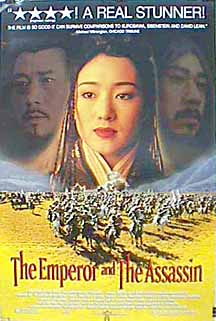Ancient Chinese Epic - - The Emperor and the Assassin
Genre: Historical Drama
Grade = A-
Chinese with English subtitles

Set in the year 320 B.C., the overly ambitious Ying Zheng (Li Xuejian), King of Qin, China, has
just conquered the neighboring Kingdom of Han. His obsessive goal, left to him by his ancestors,
is the unification of the seven kingdoms of China under one leader. Him of course. One down,
five to go.
Ying explains that his goal of unification is from the purest motives of eliminating the suffering of the people from the constant wars between the seven kingdoms. Or so he says. Next, King Zheng has plans to attack the Kingdom of Yan. He realizes, however, that this move might cause the remaining kingdoms to unite against him and foil his long-term ambitions. His supposedly ulturistic motives convinces Lady Zhoa (Gong Li - The Story of Qiu Ju, Raise the Red Lantern, To Live, Shanghai Triad), his concubine and lover from childhood, to devise an intricate assassination plot as an excuse for declaring war and destroying Yan. Lady Zhoa has her face branded as a criminal and with the returning hostage prince of Yan travels there as a spy and agent provocateur. The cruelty of the brand convinces the prince of Yan of her sincerity and with her he plots to assassinate King Zheng. Thus, things are going according to plan.
Enter the assassin (hence the title of the film). Jing Ke (Zhang Fengyi) is the most highly respected assassin in the kingdom and is given the assignment of killing a sword maker and his family because the sword maker owes money to a lord. Jing deftly slays the family with style and grace. However, while looting the shop for a really great sword he is surprised by the blind 14 year-old daughter of the sword maker. She begs him to kill her as well as now she will be left only to beg on the street. “That’s true,” Jing comments as he continues to examine his new sword. Much to Jing’s surprise the girl stabs herself in the chest. He then realizes that life is precious and takes up selling sandals instead.
Arrested after an altercation with a merchant (lethal that is), he is recognized by Lady Zhoa and is given the opportunity to take up the commission to kill King Zheng. Acting on his new found philosophy of nonviolence (except for the merchant) and having no fear of death, he would sooner die than take another life and he refuses. Lady Zhoa convinces the prince of Yan to let her try to change his mind and in doing so she falls in love with him.
Meanwhile, King Zheng uncovers a plot to oust him by his mother and the Marquee, his mother’s young lover and father of her recent children. When captured and confronted by Ying, the Marquee discloses Ying’s true lineage, one that jeopardizes his position as King and his goal of unification. This is the great moment of change for the King, and not a good one. He embarks upon an reign of terror and brutality against all who, he believes, who may have this knowledge and anyone who stands between him and his ultimate destiny. Filled with revenge for acts against him when he was a hostage as a child, he invades the Lady Zhoa’s neighboring home kingdom. The viciousness of the attack and the slaughter of the children turns Lady Zhoa against him. Now she really wants him dead and convinces Jing to act in order to save the lives of children and prevent future atrocities.
This is film is similar to the old fashioned epics that Hollywood used to produce before the 1960's, telling the tales of legendary historical figures with grand ambitions and with an impact on our lives today. It can be considered the ancient Chinese equivalent of the Ten Commandments or on the other hand, The Godfather. Its big. Its grand. Its nearly three hours long. Produced as one of the most expensive red Chinese films of all time, it is beautifully cinemagraphed with special aesthetic attention to the production design’s historical detail of costumes, weapons, artifacts, architecture and supposedly mannerisms. The elaborately constructed storyline may seem familiar, however, that’s what history can do to a story. The brutal murder of children, not once, but several times, can seem shocking in a film, but this is history and things just as bad were occurring in Europe at the same time. Thus, the aura of tragic inevitability permeates the film with a devastating conclusion. Great performances by Gong Li (Lady Zhoa), now one of China’s leading actresses, and Zhang Fengyi (Jing Ke). The only problem with the film is that it seems some of the actors may have been trained in the Chinese classic theater. This type of theater tends produce grand gestures and even worse, overacting, that is, melodramatic acting on the part of some characters. Otherwise, expect to see this film nominated for best foreign language film at the Oscars, and it is well worth your attention.
Back to Ryanburg's Reel Reviews
The Intelligent Person's Guide to Anime
Ryanburg's Home Planet